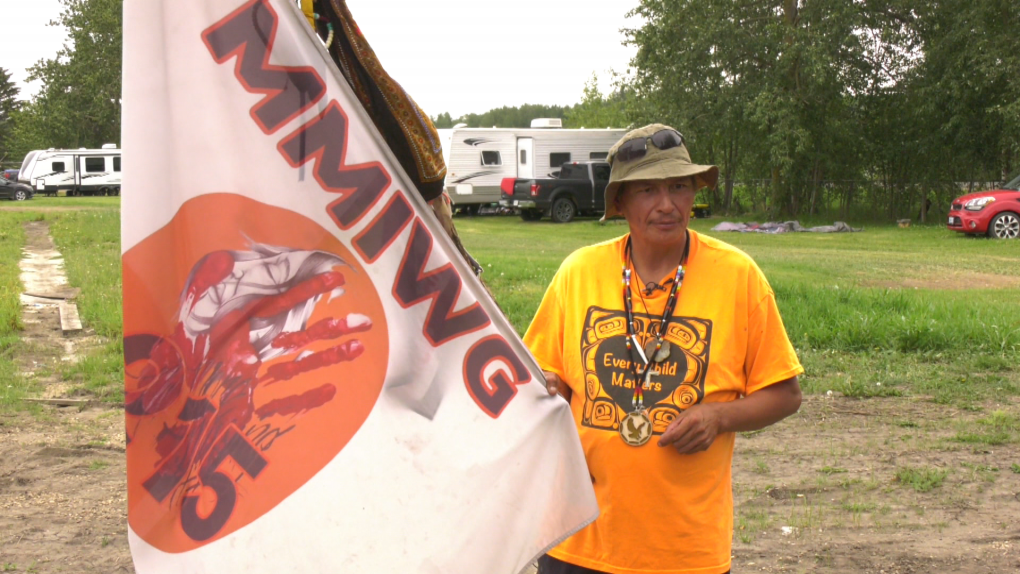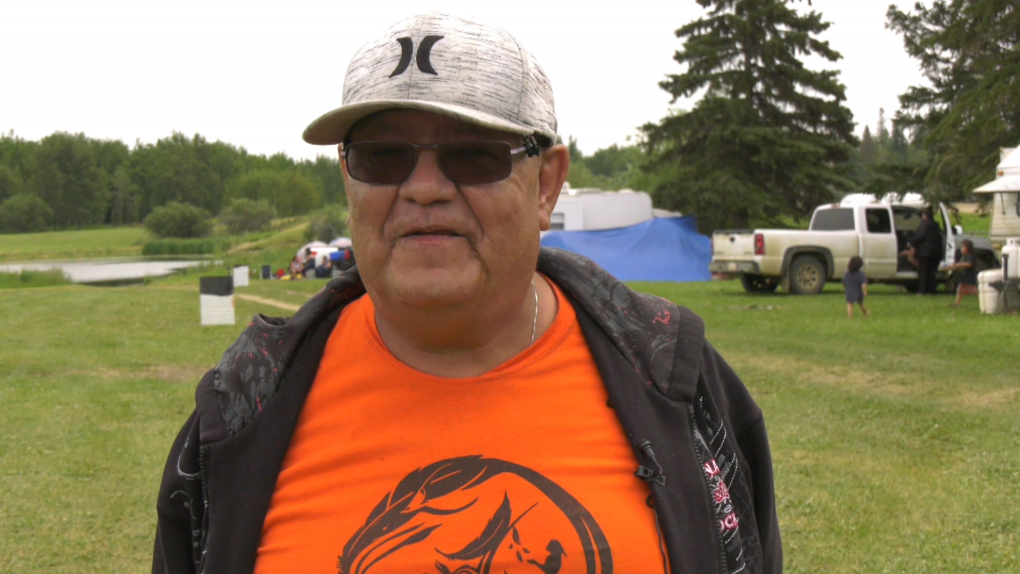Annual Lac Ste. Anne pilgrims supported by Alexis Nakota Sioux Nation ahead of Papal visit
Typically around this time of year, many Indigenous People would be heading to Lac Ste. Anne to camp and prepare for pilgrimage.
With the Papal visit, that site is off limits for the time being, so Alexis Nakota Sioux Nation opened their powwow grounds to anyone used to the annual tradition.
"We wanted to support the pilgrims who travel here every year," said Chief Tony Alexis of the Alexis Nakota Sioux Nation. "It's been a couple of years since the pilgrimage has happened, and they were eager to come here and camp."
Chief Alexis explained that the lake area was always spiritually significant for Indigenous Peoples, who refer to it as Wakamne, meaning God's Lake.
"Traditionally, in our community, people walk as part of their penance," he said. "They walk barefoot from here to Lac Ste. Anne, so that's about an eight-kilometre walk, and they visit the monument for St. Anne, and then they go to the lake (itself)."
While the pilgrimage has happened for more than 100 years, Chief Alexis said Indigenous People would gather at the lake for generations before that.
"It was a place for trade," he added. "It was a very special place."
There are about 70 campers so far taking part, with some coming as far as Ontario or the U.S.
"For them to have a place to gather before pilgrimage is important," he added.
The Pope will be heading to Lac Ste. Anne on Tuesday, where he's expected to take part in the annual pilgrimage at a ceremony, a day after he is scheduled to visit Maskwacis and the former site of the Ermineskin Indian Residential School.
It is anticipated that he will reiterate an apology for the residential school system and the Catholic Church's role in inflicting intergenerational trauma on Indigenous Peoples.
"To know that he is here on Treaty 6 territory is a wonderful feeling," Chief Alexis said. "The leader of the Church is here on the land, and he is here to provide an apology.
"For us, if the leader is saying I apologize, accepting the wrongs of the Church, we expect the entire Church to lift that responsibility and carry it forward," he added. "It cannot be only the Indigenous community doing this.
"For us, we are taking that initiative of healing, and we are working very hard on that internally. But the apology is a validation of the harms that were done to Indigenous Peoples."
Adam McDonald, one of the campers at Alexis Nakota Sioux Nation, has travelled across Canada by foot to bring awareness to missing and murdered Indigenous women and girls, and children that did not make it home from residential and day schools.
"We need that reconciliation," McDonald said. "We need the words from him. We need the healing.
"No more hiding," he added. "We need a gentleman that can really give us that healing."
"After the Pope blesses the water (at Lac Ste. Anne) that's where I'm going to release a lot of that weight, a lot of that weight from what I have been doing and have far I have walked… that I have been carrying for numerous years."
 Adam McDonald has travelled across Canada by foot to bring awareness to missing and murdered Indigenous women and girls, and children that did not make it home from residential and day schools (CTV News Edmonton/Alison MacKinnon).
Adam McDonald has travelled across Canada by foot to bring awareness to missing and murdered Indigenous women and girls, and children that did not make it home from residential and day schools (CTV News Edmonton/Alison MacKinnon).
Another camper, Terry Harvey Fontaine, is a residential school survivor, who made the trip from Prince Albert, Sask., to attend the pilgrimage and Papal visit.
"My mother brought me here when I was young," Fontaine said, adding that he has regularly attended the pilgrimage.
 Terry Harvey Fontaine looks forward to hearing the Papal apology for the Catholic Church's role in administering the residential school system (CTV News Edmonton/Alison MacKinnon).
Terry Harvey Fontaine looks forward to hearing the Papal apology for the Catholic Church's role in administering the residential school system (CTV News Edmonton/Alison MacKinnon).
He looks forward to hearing the Pope's apology and hopes it marks a shift in how Indigenous People are treated.
"It's nice for the holy person to come to tell us, to apologize. It'll make me happy, which we won't do to children in this land anymore. (To show) that we want to raise them with love and kindness," he added. "So we can be one again."
With files from CTV News Edmonton's Alison MacKinnon
Contact the Indian Residential School Survivors Society toll-free 1 (800) 721-0066 or 24-hour Crisis Line 1 (866) 925-4419 if you require further emotional support or assistance.
CTVNews.ca Top Stories

BREAKING Emergency crews responding to avalanche in Whistler, B.C., area
Paramedics and search crews have been dispatched to the scene of an avalanche that struck Monday in the Whistler, B.C., area.
Quebec fugitive killed in Mexican resort town, RCMP say
RCMP are confirming that a fugitive, Mathieu Belanger, wanted by Quebec provincial police has died in Mexico, in what local media are calling a murder.
Bill Clinton hospitalized with a fever but in good spirits, spokesperson says
Former President Bill Clinton was admitted Monday to Georgetown University Medical Center in Washington after developing a fever.
Trump again calls to buy Greenland after eyeing Canada and the Panama Canal
First it was Canada, then the Panama Canal. Now, Donald Trump again wants Greenland. The president-elect is renewing unsuccessful calls he made during his first term for the U.S. to buy Greenland from Denmark, adding to the list of allied countries with which he's picking fights even before taking office.
Pioneering Métis human rights advocate Muriel Stanley Venne dies at 87
Muriel Stanley Venne, a trail-blazing Métis woman known for her Indigenous rights advocacy, has died at 87.
King Charles ends royal warrants for Ben & Jerry's owner Unilever and Cadbury chocolatiers
King Charles III has ended royal warrants for Cadbury and Unilever, which owns brands including Marmite and Ben & Jerry’s, in a blow to the household names.
Man faces murder charges in death of woman who was lit on fire in New York City subway
A man is facing murder charges in New York City for allegedly setting a woman on fire inside a subway train and then watching her die after she was engulfed in flames, police said Monday.
Canada regulator sues Rogers for alleged misleading claims about data offering
Canada's antitrust regulator said on Monday it was suing Rogers Communications Inc, for allegedly misleading consumers about offering unlimited data under some phone plans.
Multiple OnlyFans accounts featured suspected child sex abuse, investigator reports
An experienced child exploitation investigator told Reuters he reported 26 accounts on the popular adults-only website OnlyFans to authorities, saying they appeared to contain sexual content featuring underage teen girls.
































